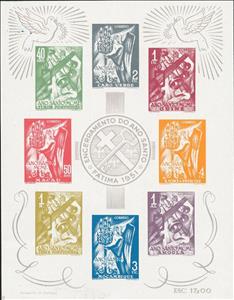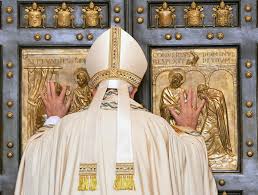Souvenir Sheet: Extension of Holy Year (Portuguese Colonies 1951)
Extension of Holy Year (Portuguese Colonies 1951)
01 January (Portuguese Colonies ) within release Holy Year Extension Souvenir Sheets (1951) goes into circulation Souvenir Sheet Extension of Holy Year face value 17 Portuguese escudo
| Souvenir Sheet Extension of Holy Year in catalogues | |
|---|---|
| Michel: | Mi: PT-CO BL2 |
| Yvert et Tellier: | Yt: PT-CO BF2 |
| Afinsa-Mundifil: | Afi: PT-CO BL2 |
Souvenir Sheet is vertical format.
Sheet contains one imperforate version of stamps produced for the Portuguese Colonies for the 1950-1951 Holy Year Omnibus Issue Sold for 17$00 Footnoted in ScottAlso in the issue Holy Year Extension Souvenir Sheets (1951):
- Souvenir Sheet - Extension of Holy Year face value 17;
- Souvenir Sheet - Extension of Holy Year - Our Lady of Fatima face value 11;
Souvenir Sheet Extension of Holy Year it reflects the thematic directions:
in Western Christianity, the tradition dates to 1300, when Pope Boniface VIII convoked a holy year, following which ordinary jubilees have generally been celebrated every 25 or 50 years, with extraordinary jubilees in addition depending on need. Catholic jubilees, particularly in the Latin Church, generally involve a pilgrimage to a sacred site, normally the city of Rome. The Catholic Church declared the Extraordinary Jubilee of Mercy for 2015–2016.
The pope (Latin: papa, from Ancient Greek: πάππας, romanized: páppas, lit. 'father') is the bishop of Rome and the visible head[a] of the worldwide Catholic Church. He is also known as the supreme pontiff, Roman pontiff, or sovereign pontiff. From the eighth century until 1870, the pope was the sovereign or head of state of the Papal States, and since 1929 of the much smaller Vatican City state.From a Catholic viewpoint, the primacy of the bishop of Rome is largely derived from his role as the apostolic successor to Saint Peter, to whom primacy was conferred by Jesus, who gave Peter the Keys of Heaven and the powers of "binding and loosing", naming him as the "rock" upon which the Church would be built. The reigning pope is Francis, who was elected on 13 March 2013.

